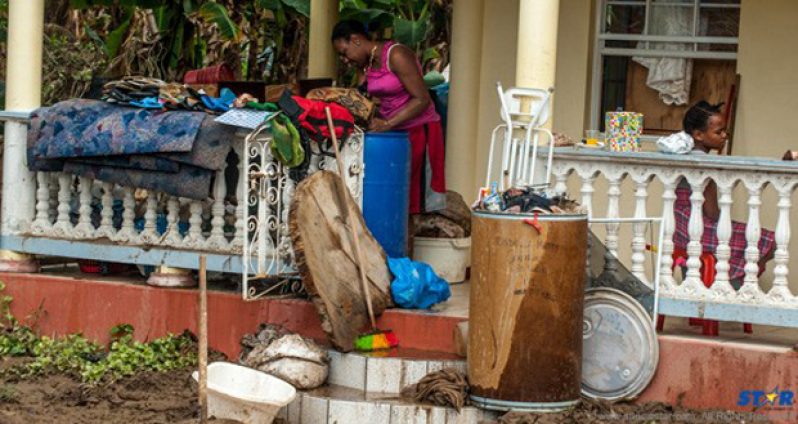AS IF the combination of slow to negative economic growth and spreading unemployment and criminality were not enough pain for them, devastating floods have now created more widespread suffering for thousands of people in the Eastern Caribbean located in St.Vincent and the Grenadines, St Lucia and Dominica.
At the time of writing on Friday, reports confirmed at least 13 deaths; widespread destruction and damages to homes, business places, infrastructure and the vital agricultural sector.
While the governments of the trio of affected islands were engaged in assessing the full extent of destruction and damages, expected to run into millions of dollars, the Caribbean Disaster and Emergency Management Agency (CEDEMA) was preoccupied with coming forward with its own estimates, with a view to advising on priority areas for immediate and possible future assistance.
The Heads of Governments of Trinidad and Tobago, Jamaica, Guyana and Barbados have already mixed their communicated messages of sorrow with initial pledges of emergency assistance to be identified by the victim countries of the unexpected consequences of torrential rain and windstorm.
Prime Minister Kamla Persad-Bissessar, who was quick to publicly declare emergency assistance to St. Lucia, for a start, is facing a serious environmental problem of her own at home over last week’s massive oil spills in the Gulf of Paria.
The spills have sparked claims of likely sabotage by the State-owned Petrotrin, while the Oilfields Workers Trade Union (OWTU) is demanding that the affected well be urgently destroyed to avoid further damages and disruption to normal livelihood.
Two crucial reports
Meanwhile, in what may be cautiously welcome news, the World Bank announced on Boxing Day that it has decided to pursue a path, as determined during 2013, to “fuse sustainable development” with identifiable future development goals.
This approach, it said, “requires promoting environmental, social and fiscal sustainability…”
Well, it so happens that CARICOM governments are yet to disclose if they have received an anxiously awaited report from the Caribbean Growth Forum (CFG).
The Forum, which was launched in Washington last year, comprise representatives of the World Bank; International Monetary Fund; Inter-American Development Bank; Caribbean Development Bank; and the University of the West Indies.
It’s one of two crucial reports on future development for the CARICOM region. The other, as previously pointed out, has to do with the decision by CARICOM Heads of Government at their last July summit in Port-of-Spain to establish a ‘CARICOM Economic Commission’.
The intention is for the Commission to address “priority areas for regional fiscal sustainability and resource mobilization as well as critical infrastructural services particularly in energy and information communications technology (ICT).
It is, however, of significance to note that the Heads’ decision to establish the ‘CARICOM Economic Commission’ would have been taken WITHOUT being in the possession of the far-reaching report expected from the Caribbean Growth Forum.
Barbados scenario
At this time, the broadening social and economic problems in the region are posing increasing challenges for a number of governments within the 15-member Community, with Barbados being the most affected at present.
With some 3,000 public sector workers facing retrenchment in the first quarter of 2014, Prime Minister Freundel Stuart is expected to make significant changes in a Cabinet reshuffle that could be disclosed in his coming New Year message to the Barbadian people.
The Cabinet changes are expected to include replacement of controversial Finance Minister, Chris Sinckler, by Minister of Agriculture, Dr David Estwick.
Also, the appointment of what has long been absent from Mr Stuart’s administration: A Deputy Prime Minister. Current thinking suggests that this portfolio is most likely to be allotted to Tourism Minister, Richard Sealy.
Across in Guyana, President Donald Ramotar’s administration continued to face recurring challenges during 2013 in parliament from a combined opposition with a one-seat majority in the 65-member National Assembly, a development that kept alive speculations of a likely snap general election in 2014. One is not due before November 2015.
Analysis by Rickey Singh




.png)









